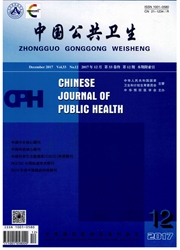

 中文摘要:
中文摘要:
目的 探讨免疫预防后母亲及其新生儿HBeAg阳性对乙型肝炎病毒(HBV)宫内感染及婴儿产生抗.HBs的影响。方法 以194例HBsAg阳性孕妇及其所生的196例婴儿为研究对象。通过随访分析母亲或新生儿HBeAg阳性对HBV宫内感染的发生、新生儿HBV持续感染及其与婴儿抗.HBs产生的关系。结果 196例新生儿有10例发生宫内感染,母亲或新生儿HBeAg阳性是宫内感染的危险因素(P〈0.05),RR值分别为4.76(1.28~17.67)、5.53(1.49~20.48),共有1例HBV宫内感染慢性化的婴儿,其出生时HBeAg也阳性。在出生于HBeAg阳性母亲的婴儿、HBeAg阴性母亲的婴儿之间,在出生时HBeAg阳性的婴儿、出生时HBeAg阴性的婴儿之间,在1,4,7月龄随访时各组间抗-HBs的A值差异均无统计学意义(P〉0.05)。结论 HBeAg可自由通过胎盘,因此该指标不能作为宫内感染与否的判断指标。免疫预防后母亲及新生儿HBeAg阳性与否在宫内感染和慢性化中仍起重要作用。但对婴儿抗-HBs的产生无影响。
 英文摘要:
英文摘要:
Objective To investigate the effect of maternal or neonatal HBeAg positive on the intrauterine infection of HBV and the production of anti-HBs in the infants. Methods 194 HBsAg-positive pregnant women were consecutively collected and investigated as subjects from ward of Maternal and Children Health hospital of Shaanxi province, and their infants were followed up. The relationship of maternal or neonatal HBeAg positive with intrauterine infection of HBV, chronicity and the production of anti-HBs in the infants were analyzed. Results Ten of 196 neonates were identified as occurrence of HBV intrauterine infection. The pregnant women' s HBeAg positive and neonatal HBeAg positive were important risk factors of HBV infection in uterus( RR = 4.76, 5.53, respectively), and there were statistical significance( P 〈 0.05 ). One infant who was HBsAg/HBeAg-positive at birth, born to HBeAg-positive mother, developed to HBsAg carrier. The difference of ab- sorbency value of anti-HBs was no statistically significance between infants born to HBeAg-positive mothers and those born to HBeAg-negative mothers;and among infants of HBeAg-positive at birth or HBeAg-negative at birth during followed up at 1, 4, 7 months of age(P 〉 0.05). Conclusion HBeAg may cross placenta freely, so it can' t be used as an diagnosis indicators of HBV intrauterine infection. HBeAg in neonates or pregnant women played an important role in HBV intrauterine transmission and its chronicity, but not in the production of anti-HBs.
 同期刊论文项目
同期刊论文项目
 同项目期刊论文
同项目期刊论文
 期刊信息
期刊信息
